Dashnor Kaloçi
Memorie.al publishes the memoirs of the former career diplomat and Deputy Minister of Foreign Affairs, Sokrat Plaka, who for more than 30 years, served as Albania’s ambassador to several countries. His testimonies about the secret talks with the Ambassador of the Federal Republic of Germany in Belgrade, and the negative response of official Tirana to the assistance that Bonn offered at that time for the small communist state of the Balkans, after Enver Hoxha himself had given permission for those talks. Ambassador Plaka’s meeting with Prime Minister Mehmet Shehu in 1979 during an hour-long conversation in his office, where he authorized Ambassador Plaka to start talks immediately, in the hope that the German side would pay the war reparations. How did the Albanian side delay the talks with the German side, which was very ready for the respective diplomats to meet in Bonn, Vienna or Belgrade, raising all kinds of obstacles, until the German ambassador in Belgrade was transferred to Portugal and in his country, another diplomat came, but already with other instructions from the government of the Federal Republic of Germany …!
It is already known to all Albanians the private visit made to our country in the mid-80s by the former Prime Minister of Bavaria, Josef Strauss (with his two sons), who was one of the first politicians of Western countries who was able to tear down the ‘iron curtain’ of Enver Hoxha’s communist regime before the 1990s after a permit issued by Enver Hoxha himself in the last years of his life. That visit is ingrained in the minds of Albanians, not only for the fact that a foreign politician of that rank from a Western country, violated for the first time in our country, but for what he offered to senior officials of the communist leadership of Albania. of that time. As rumored in the close quarters of senior officials of that time, and fully illuminated after the ’90s by the memories and testimonies of some of the leaders of the Albanian state who held talks with the senior German politician, the visit of The Strauss was neither more nor less than the ‘outstretched hand’ of a powerful Western country, to help one of Europe’s poorest and most isolated countries. And to that help, which the German state offered as a kind of apology for what it had caused to this small Balkan state during the Second World War, the top leaders of communist Albania, responded negatively!
The extreme ideological dogmatism of the Albanian officials did not allow them to “bow before the imperialists” and that event has already remained in the historical memory of the Albanians, as the lost chance of opening our country with the West. But was this the only case that communist Albania lost in this way? “No.” This statement is made by the former career diplomat and at the same time Deputy Minister of Foreign Affairs, Sokrat Plaka, who for more than 30 years, has served as Ambassador of Albania in some of the most important diplomatic headquarters of that accredited time in western countries. In his memoirs that Memorie.al publishes in this article, Mr. The old woman introduces us to his secret talks with two of the German ambassadors in Belgrade, in the years 1977-’78, which had to do with a normalization of relations between the two countries and the negative response of official Tirana, for the help that offered by Germany!
Memoirs of former Ambassador Sokrat Plaka
In 1977 I received a circular instruction, which was sent to all our embassies in Europe, regarding reparations from the Federal Republic of Germany. In fact, it was about the development of the memorandum of the Albanian government of June 18, 1965, about the reparations sent to the government of the FRY divided into two main chapters: material damages (about $ 4 billion in 1938) and social security ($ 800 million). of 1938). The aim was to involve the Germans in the talks, to reach concrete results. In the past, attempts at direct contact had been made, but the Germans had avoided them. I thought that something could be achieved through third parties, so I had lunch in June 1977 with my Swedish friend, Count Lewenhaupt, a tall, elderly, knowledgeable man with a broad culture. We were friends in both directions; his wife had similar relations with the wife of the German ambassador, Von Puttkamer, and with my wife. This friendship was not so much for opportunism as for professional skills. We had lunch at the restaurant “Ushçee” in Belgrade, by the river Sava and had a cordial conversation. At first, conditions had to be created to get in touch with the FRG, to start negotiations between the two countries in order to get the reparations it owed us, starting with the social security chapter. Lewenhaupt understood the purpose of the conversation and said further in the form of a question, that: there is nothing like informing German Ambassador Puttkamer about this conversation. I approved. In the evening, at the reception of the Afghan embassy, the three ambassadors met together and the Swedish ambassador, mentioned our conversation about reparations, seems to reassure the German ambassador about the content of the conversation we had together. I said two words to confirm what Lewenhaupt said. It should be added that the ambassadors’ wives were Swedish and close friends. About a month later, on July 14, in anticipation of Iraq’s national holiday, before Puttkamer left, he found the opportunity and “naturally” we just got together. The conversation was brief on relations between the two countries, but the German ambassador focused on the issue of reparations, which had become the ‘key’ to diplomatic relations between Albania and the FRY. I came up with the idea that both sides could talk and solve their problems this way. Puttkamer was a typical German, serious, calm, “cold”, but if he got into an issue, he wanted to take it to the end. He underlined that the claim of the Albanian side for the reparations of 4 billion USD of 1938, was a colossal amount and could not be taken as a basis for negotiations. I confirmed that talks could begin on the social security chapter. The mesaduket ambassador wanted this, to be sure of what the Swedish ambassador had said about the reparations.
“My meeting with the German ambassador in Belgrade”
It was not long before two weeks later, on the eve of the Swiss national holiday, August 1, Puttkameri pulled me aside for a confidential conversation and said: “The Government of the Federal Republic enthusiastically appreciates the position of the Albanian side in resolving the problems between two countries. She proposes that talks between the two governments on reparations in the field of social security in Belgrade, Vienna or Bonn begin immediately, at the request of the Albanian side. It will be good, he continued, for the Albanian side to present in these talks the relevant documents for the compensations that the Federal government is obliged to give for the damages caused to the Albanian citizens during the Second World War “. So, the ambassador clarified three issues:
- He praised the readiness of the Albanian government to negotiate with the federal government and in this way expressed the understanding of its government for the situation in which Albania was with the cessation of Chinese aid and the willingness to help it in some way.
- That the talks start immediately, without leaving others a chance to take advantage of Albania’s difficult economic position, and especially here it is about the countries of Eastern Europe, allies of the Soviet Union.
- Puttkamer underlined that the compensation for the social security chapter would be discussed, so that there would be no misunderstandings afterwards, especially regarding the reparations for the material damages for which the German government under the 1953 London Agreement did not make any commitment… I thanked the ambassador for the concrete and constructive proposal of the German government and assured him that I would immediately inform my government. And so, I did.
“My telegram for Tirana regarding the meeting”
In the telegram I sent to Tirana, I noted that regarding our response to this proposal, it should be borne in mind that Ambassador Puttkamer would soon leave Belgrade for the summer holidays and would return in early September. The Swedish ambassador, who was informed by his friend Puttkamer, expressed his optimism for the German proposal, describing it as an iceberg and of great benefit for the relations between the two countries and especially for Albania. I told him that I thought so too and thanked him once again for his contribution to this issue. I ordered the embassy coder to make Tirana’s response to the Germans work with priority. But she did not come, and the ambassador left for Bonn. A lot of ideas went through my mind, maybe it was the request for documentation, where we were weak, but I still thought that a reaction in some way had to be made at least to show respect for the German government. Then she came, it was a short answer, deeply thought out politically, only she lacked one thing: she did not mind addressing Federal Germany: “Ask Ambassador Puttkamer to make the proposal in writing.” This was the content of the answer that Tirana sent us. So, it seemed that our side was not for the talks to start immediately, because perhaps he was afraid of being accused of being “sold to imperialism”, although our argument was legally grounded because the talks were about a right of our citizens damaged during wartime by the Third Reich. But for Tirana, the ideological struggle to “unmask imperialism” was “principled.” I was sorry for such behavior, moreover that Federal Germany had long since stopped paying reparations; even for social security. She made such a gesture as a special case for Albania, but never made an official confirmation note for reparations that would put her in a difficult position tough other states that had analogous claims. The German ambassador returned to Belgrade on the eve of an excursion of the Yugoslav capital’s diplomatic corps, organized in October 1977 by the Secretary of Foreign Affairs. On this occasion, I gave Puttkamer the answer to his government proposal. Puttkamer said: “I need the authorization of the center for this, I will ask the Foreign Ministry in Bonn and I will inform you”, Puttkamer answered correctly, but not without hidden surprise. I asked him and in some other cases he always told me calmly: “we do not have an answer from Bonn yet”.
“Voice of the People” in attack against imperialism!
Meanwhile, the “Voice of the People” was full of criticism against “imperialism and revisionism” and mainly against the Great Powers. So, in 1978, Tirana remained loyal to its political line. For the West, there was no longer any danger of Albania joining the East after the breakdown of relations with China, as one might think in 1977. No one in Tirana was thought to give a positive answer to Puttkamer during this time. The breakdown of relations with China was making our country’s leadership think seriously about ways out of economic hardship. The autarkic character of our fully state-owned economy could not open that perspective. In February 1979, I was called to Tirana. At the Ministry of Foreign Affairs, I was told that it had been decided by the top leadership to set up the Federal Republic of Germany and the United Kingdom, respectively, to solve the problems of war reparations and that of monetary gold. Problems would be addressed with the ambassadors of the respective states in Belgrade. It is undoubtedly a positive initiative, despite the fact that the moment was not as favorable as in 1977. I did not find it difficult to delve into the details of the problem. At the time when he was Minister of Foreign Affairs, Behar Shtylla, I had to go through the problems of reparations, as well as those of monetary gold. I therefore prepared the thesis of the position on both issues which were discussed at the close meeting of the Ministry of Foreign Affairs. As was usually done in formulating our attitudes, it was enough just to determine the position for the first meetings.
Mehmeti: Socrates, talk to the Germans
At the end, the Prime Minister Mehmet Shehu himself received me in a special meeting, who after hearing about the preparations spoke to me calmly and with a tone of optimism, focusing on the main issues and added that depending on the progress of the talks, the positions that would be be adopted in the future. Since he ignored mentioning it, I suggested if I could start the conversation with the German ambassador where we had left it about two years ago, that is, give him a positive response to the proposal made by the German government in July 1977, for the immediate start of talks. in Belgrade, Vienna or Bonn. The Prime Minister approved and wished me success. Thus, ended the one-hour meeting with Mehmet Shehu, where the Minister of Foreign Affairs was also present. After arriving in Belgrade, I made my first visit to Ambassador Puttkamer in his office. For the first time in the history of Albania-RF German relations, such an official meeting took place. After exchanging the usual words, I thanked him for receiving me immediately and held the conversation about the issue I went to. I referred to our conversations in July-August 1977, the proposal of the German government to start immediate talks to resolve the problem of reparations in the social security chapter, the memorandum of the Albanian government on reparations submitted to the German government on June 18, 1965. I underlined that we are now able to respond positively to his proposal that the Albanian government agrees that these talks begin immediately in Belgrade. Puttkamer said he had guessed that this would be the purpose of my visit. Then he added that I (SP) had said it was true, but “the talks and the proposal of the federal government were made about two years ago and your party did not respond and now I (Puttkamer,) do not know if, in these conditions new, Bonnie stands on his old proposal. “I will immediately notify my government (FRY),” the ambassador continued, “and I will respond with instructions from her.” Then. Puttkamer said: “As for us, if the talks start, we will bring two or three officials of the Ministry of Foreign Affairs from Bonn, who will address the problems concretely with your side.” I told him that this is normal for both parties. Now it remains for us to set the date for the start of the talks. “I will announce,” Puttkamer responded immediately. We also exchanged views on political issues and, among other things, I expressed my opinion that these talks are of special importance because they will pave the way for diplomatic, economic, cultural, etc. relations between the two countries; Puttkamer endorsed these views.
“Information for Tirana regarding the talks”
I informed Tirana about these issues by radiogram and I expected a quick response from the Germans. But that did not happen. Several weeks passed without reaction. While the informed ambassadors of Belgrade had already followed in the footsteps of my talks with Puttkamer. The ambassadors of the European Union countries held weekly consultations and exchanged views on important events related to Yugoslavia and other Balkan countries. One of them was the official Albanian-German contacts in Belgrade. This later became known to all. One day the driver of the embassy of the FRY brought to our embassy an invitation for me and my wife sent to me by Ambassador Puttkamer on the occasion of the national holiday, where he had invited all the Belgrade protocol, including the diplomatic corps. It was the first invitation for an Albanian ambassador. This invitation showed at least that the Federal Germany wanted diplomatic relations with Albania and the solution of the problem of reparations through proposals made by the Federal Germany. After receiving the approval of Tirana, I went to the German reception, congratulated the ambassador on the national holiday and expressed regret that he was transferred from Belgrade in less than four years, because both our countries had a lot of work to do and I thanked for this cooperation. I did this because the reception was given for the final departure of Ambassador Puttkamer from Belgrade. As might be expected, my presence caught the attention of Western foreign diplomats. This case was not spared, making speculations about the relations between Albania and Germany. During conversations I had on this occasion at the German embassy I mentioned that now Puttkamer would go to Bonn himself, hasten the start date of the talks, and could notify me through the charge d’affaires. Puttkamer was out of shape, but avoided touching on the issue of reparations. After Puttkamer left Belgrade, it took time for the new German ambassador Graber to take office./Memorie.al
Continues in the next issue




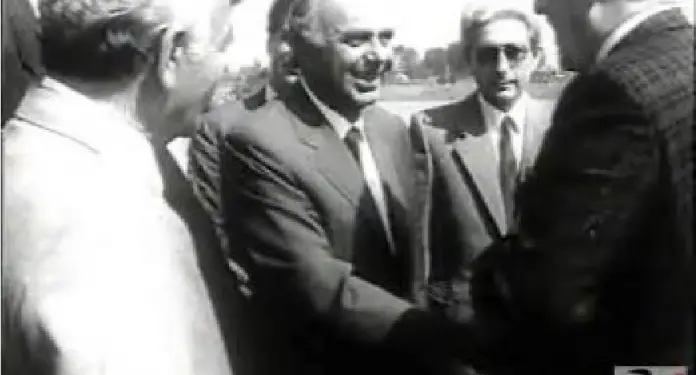
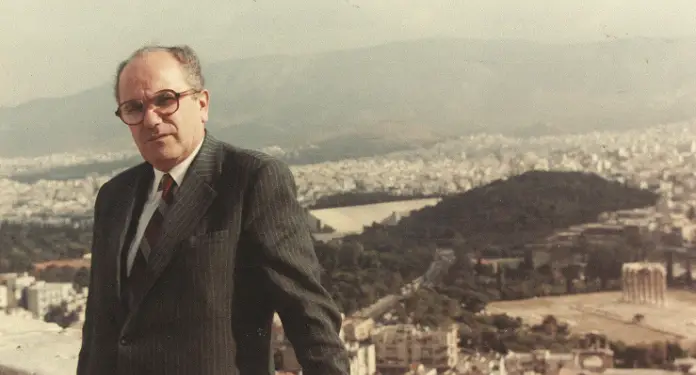
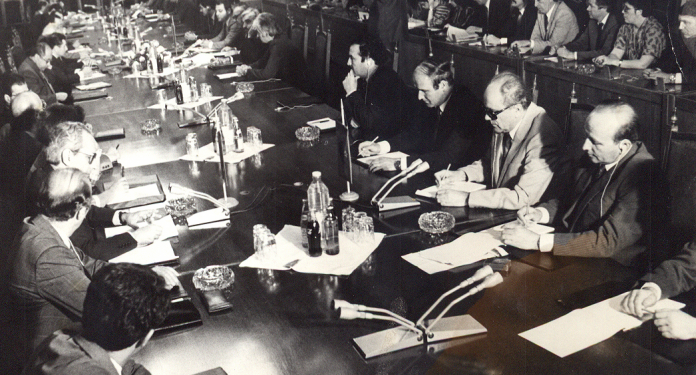
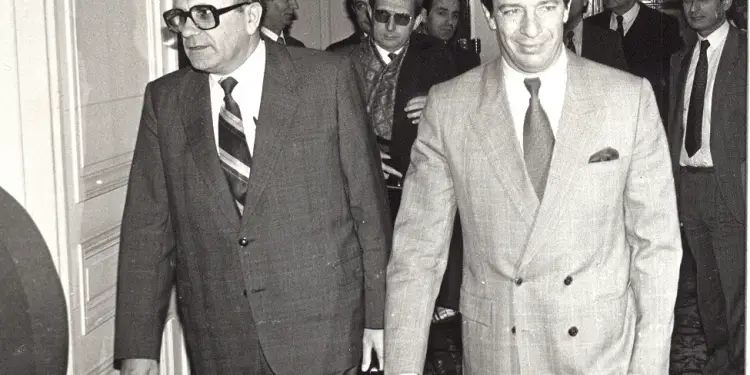
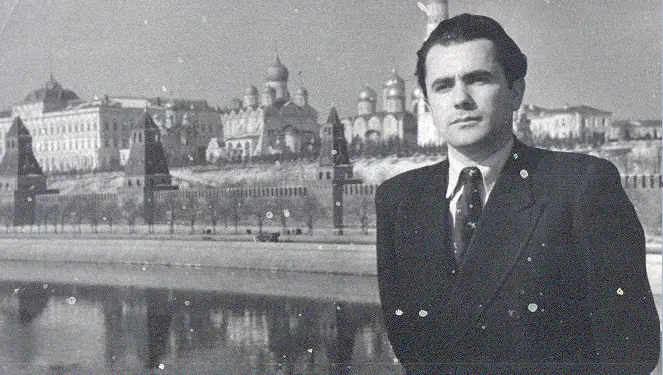
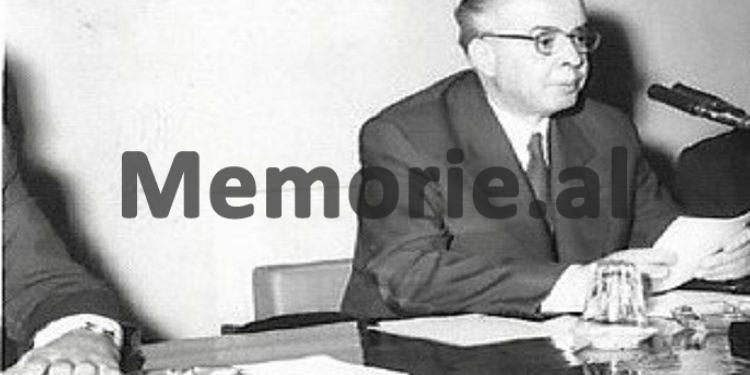
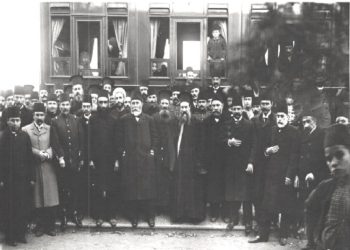
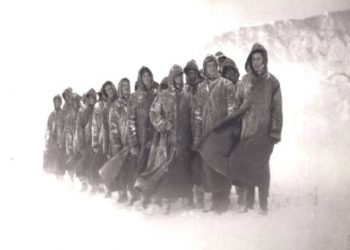

![“When the party secretary told me: ‘Why are you going to the city? Your comrades are harvesting wheat in the [voluntary] action, where the Party and Comrade Enver call them, while you wander about; they are fighting in Vietnam,’ I…”/ Reflections of the writer from Vlora.](https://memorie.al/wp-content/uploads/2025/06/admin-ajax-4-350x250.jpg)


